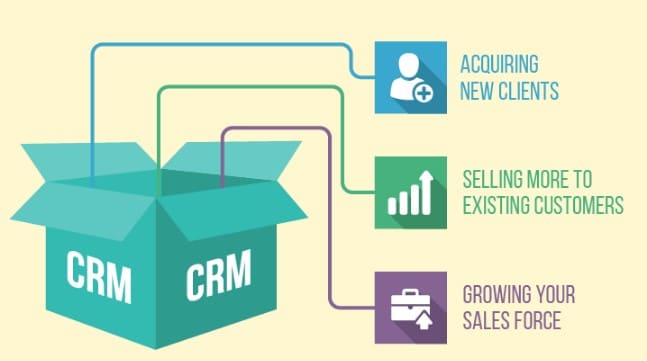If you run a small business, it can be challenging to manage customer relationships effectively. That’s where customer relationship management (CRM) tools come in.
CRM tools help small businesses automate and manage various aspects of their customer interactions, from lead generation to customer service. In this article, we’ll explore the top CRM tools for small businesses, their features, and the benefits they offer.

What is a CRM tool?
A CRM tool is software designed to help businesses manage customer interactions and relationships. It’s a central location where all customer data, including contact information, interactions, and purchase history, is stored. CRM tools also help businesses automate and manage tasks related to customer relationships, such as lead generation, sales tracking, and customer service.
Features of CRM tools for small businesses
The following are some of the essential features of CRM tools for small businesses:
Lead management
CRM tools help small businesses generate and manage leads. They provide a platform for businesses to store and track all leads, including the source of the lead, contact information, and the status of the lead.
Contact management
CRM tools help small businesses manage contact information for existing and potential customers. They provide a platform for businesses to store and track customer interactions, including phone calls, emails, and meetings.
Sales tracking
CRM tools help small businesses track sales activities, such as deals closed and revenue generated. They provide insights into sales performance and help businesses identify opportunities to improve their sales processes.
Marketing automation
CRM tools help small businesses automate marketing activities, such as email marketing and social media campaigns. They provide a platform for businesses to manage and track marketing activities and measure the effectiveness of their marketing efforts.
Customer service management
CRM tools help small businesses manage customer service interactions, including customer support requests and inquiries. They provide a platform for businesses to track and respond to customer service issues, improving customer satisfaction and loyalty.
Benefits of using CRM tools for small businesses
The following are some of the benefits of using CRM tools for small businesses:
Improved customer relationships
CRM tools help businesses improve customer relationships by providing a centralized location for customer data and interactions. This helps businesses better understand their customers’ needs and preferences, allowing them to provide more personalized and effective customer service.
Increased productivity
CRM tools help small businesses automate and manage various aspects of customer relationships, saving time and increasing productivity. This allows businesses to focus on more critical tasks, such as product development and sales.
Better sales performance
CRM tools help small businesses track sales activities and identify areas for improvement. This can lead to increased revenue and better sales performance overall.
Improved marketing effectiveness
CRM tools help small businesses measure the effectiveness of their marketing efforts and identify opportunities for improvement. This can lead to better-targeted marketing campaigns and increased return on investment (ROI).
Enhanced customer service
CRM tools help small businesses manage customer service interactions, improving customer satisfaction and loyalty. This can lead to increased customer retention and long-term profitability.
Top CRM tools for small businesses
The following are some of the top CRM tools for small businesses:
HubSpot CRM
HubSpot CRM is a free CRM tool that offers features such as contact management, lead tracking, and email marketing. It’s easy to use and integrates with other HubSpot tools, such as marketing automation and sales software.
Salesforce Essentials
Salesforce Essentials is a CRM tool designed specifically for small businesses. It offers features such as contact management, lead tracking, and sales forecasting. It’s easy to use and integrates with other Salesforce tools, such as marketing automation and customer service software.
Zoho CRM
Zoho CRM is a cloud-based CRM tool that offers features such as contact management, lead tracking, and marketing automation. It’s affordable and offers integrations with other
Insightly
Insightly is a CRM tool that offers features such as contact management, lead tracking, and project management. It’s affordable and easy to use, making it an excellent choice for small businesses.
Pipedrive
Pipedrive is a CRM tool that offers features such as contact management, lead tracking, and sales forecasting. It’s intuitive and easy to use, making it a popular choice for small businesses.
Agile CRM
Agile CRM is a CRM tool that offers features such as contact management, lead tracking, and marketing automation. It’s affordable and easy to use, making it an excellent choice for small businesses.
Conclusion
In conclusion, CRM tools are essential for small businesses looking to improve their customer relationships and overall business performance. They offer a range of features, including lead management, contact management, sales tracking, marketing automation, and customer service management. Some of the top CRM tools for small businesses include HubSpot CRM, Salesforce Essentials, Zoho CRM, Insightly, Pipedrive, and Agile CRM. By implementing a CRM tool, small businesses can improve their customer relationships, increase productivity, and enhance their overall business performance.
FAQs
- What is a CRM tool, and why is it important for small businesses?
- What are the essential features of CRM tools for small businesses?
- What are the benefits of using a CRM tool for small businesses?
- Which are the top CRM tools for small businesses?
- How can a CRM tool help small businesses improve their customer service?